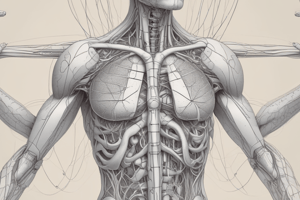Podcast
Questions and Answers
What is the primary function of the epididymis in the male reproductive system?
What is the primary function of the epididymis in the male reproductive system?
- To facilitate ejaculation
- To store and mature sperm (correct)
- To produce sperm
- To regulate testosterone levels
During which stage of the human sexual response does vasocongestion occur?
During which stage of the human sexual response does vasocongestion occur?
- Orgasm
- Plateau
- Resolution
- Excitement (correct)
What is the term for the process by which a fertilized egg implants in the uterus?
What is the term for the process by which a fertilized egg implants in the uterus?
- Gestation
- Conception
- Implantation (correct)
- Fertilization
What is the primary characteristic of informed consent?
What is the primary characteristic of informed consent?
What is the term for personal limits and preferences regarding sexual activity?
What is the term for personal limits and preferences regarding sexual activity?
What is a red flag in a sexual encounter?
What is a red flag in a sexual encounter?
What is the primary importance of respecting boundaries in sexual relationships?
What is the primary importance of respecting boundaries in sexual relationships?
What is the term for the agreement to engage in sexual activity?
What is the term for the agreement to engage in sexual activity?
Flashcards are hidden until you start studying
Study Notes
Reproduction
- Human Reproductive System:
- Male reproductive system: testes, epididymis, vas deferens, prostate gland, urethra
- Female reproductive system: ovaries, fallopian tubes, uterus, cervix, vagina
- Human Sexual Response:
- Four stages: excitement, plateau, orgasm, resolution
- Physiological changes during sexual arousal: vasocongestion, vasodilation, myotonia
- Pregnancy and Conception:
- Fertilization: sperm fertilizes egg in fallopian tube
- Implantation: fertilized egg implants in uterus
- Gestation: 38-40 weeks from fertilization to birth
Consent and Boundaries
- What is Consent?
- Informed and voluntary agreement to engage in sexual activity
- Ongoing and enthusiastic participation
- Must be given freely, without coercion or manipulation
- Types of Consent:
- Verbal consent: explicit verbal agreement
- Non-verbal consent: physical cues, body language
- Informed consent: understanding of risks, consequences, and boundaries
- Boundaries:
- Personal limits and preferences regarding sexual activity
- Communication of boundaries: assertive, respectful, and clear
- Importance of respecting boundaries: preventing sexual violence, promoting healthy relationships
- Red Flags:
- Pressure or coercion
- Lack of communication or consent
- Disrespect for boundaries or preferences
- Signs of exploitation or manipulation
Human Reproductive System
- The male reproductive system consists of testes, epididymis, vas deferens, prostate gland, and urethra.
- The female reproductive system consists of ovaries, fallopian tubes, uterus, cervix, and vagina.
Human Sexual Response
- The human sexual response cycle has four stages: excitement, plateau, orgasm, and resolution.
- During sexual arousal, physiological changes occur, including vasocongestion, vasodilation, and myotonia.
Pregnancy and Conception
- Fertilization occurs when a sperm fertilizes an egg in the fallopian tube.
- After fertilization, the egg implants in the uterus, a process known as implantation.
- The gestation period typically lasts 38-40 weeks from fertilization to birth.
Consent and Boundaries
- Consent is an informed and voluntary agreement to engage in sexual activity, involving ongoing and enthusiastic participation.
- Consent must be given freely, without coercion or manipulation.
- There are three types of consent: verbal consent, non-verbal consent, and informed consent.
- Verbal consent involves explicit verbal agreement, while non-verbal consent involves physical cues and body language.
- Informed consent requires understanding of risks, consequences, and boundaries.
Boundaries
- Boundaries refer to personal limits and preferences regarding sexual activity.
- Communicating boundaries is crucial, and should be done in an assertive, respectful, and clear manner.
- Respecting boundaries is essential to prevent sexual violence and promote healthy relationships.
Red Flags
- Red flags in sexual relationships include pressure or coercion, lack of communication or consent, and disrespect for boundaries or preferences.
- Other signs of exploitation or manipulation are also red flags.
Studying That Suits You
Use AI to generate personalized quizzes and flashcards to suit your learning preferences.




